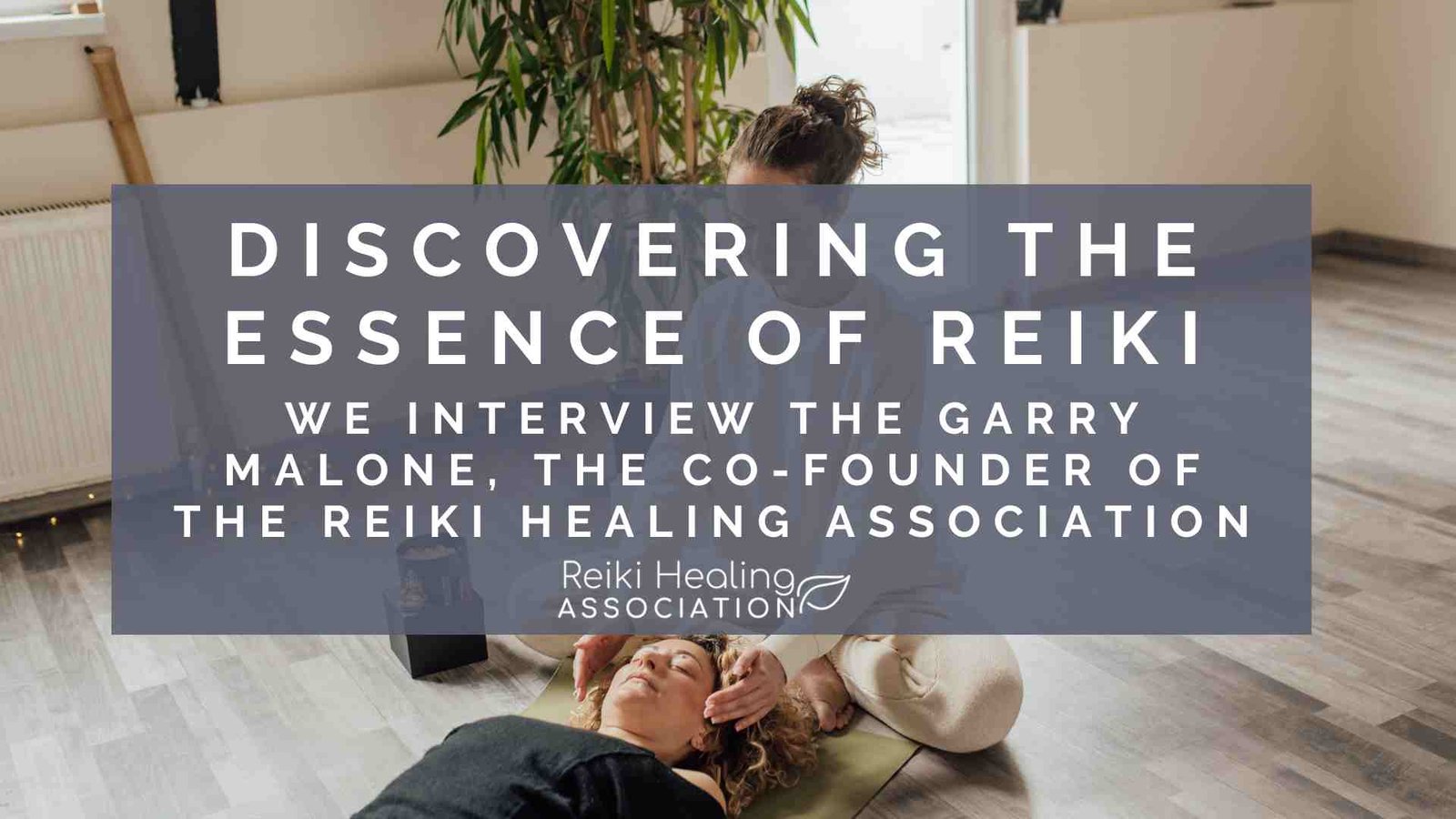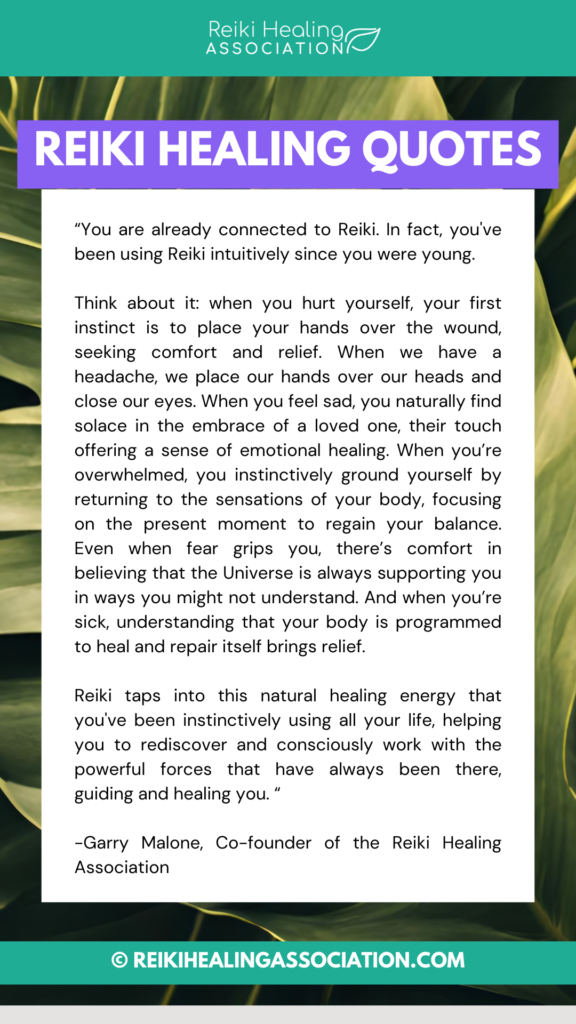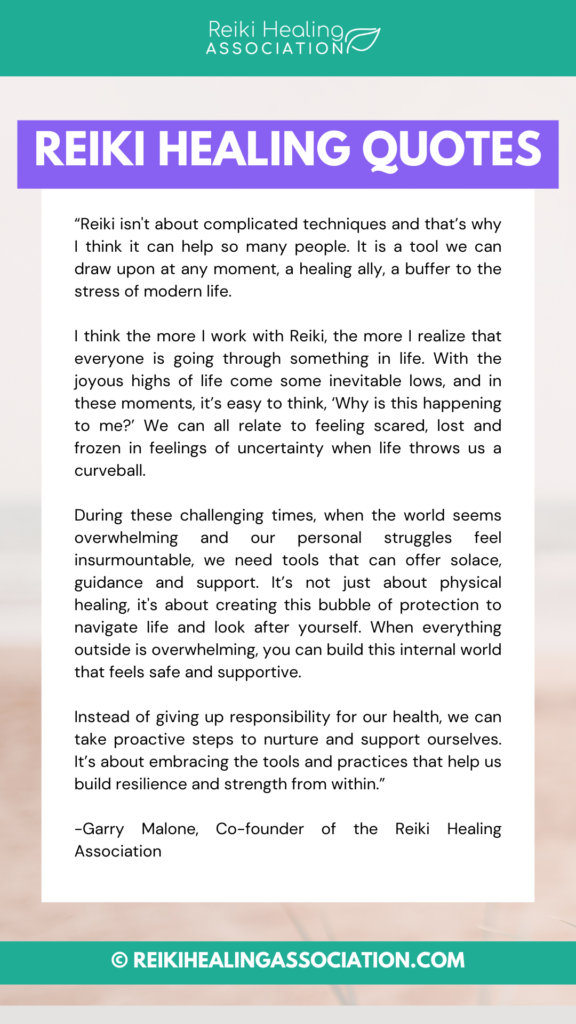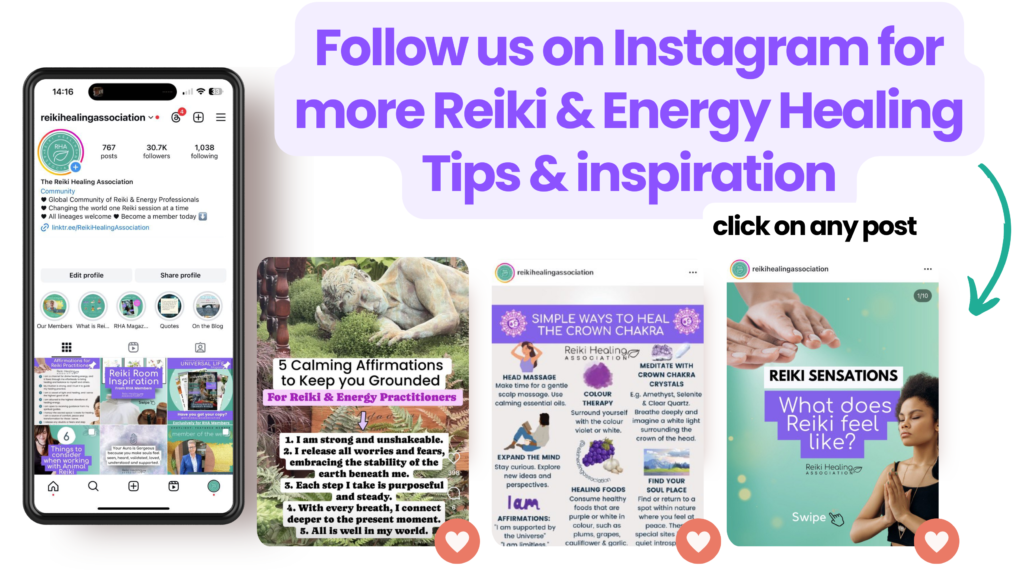
Discovering the Essence of Reiki: We interview the Garry Malone, the Co-Founder of the Reiki Healing Association
We sat down with the co-founder of the RHA to talk Reiki misconceptions, tips for new energy practitioners & the how the RHA came to be.
With a mission to spread the ancient art of Reiki to a global audience, Garry Malone has dedicated the last three decades to teaching, healing, and inspiring others. Today, we are thrilled to delve into his journey, and uncover the story behind his remarkable contributions to the world of spiritual healing.
How did you find your way to Reiki all those years ago?
If you’ve been through any of my energy training programmes, you’ll know that I was instinctively drawn to Reiki while searching for ways to help my sister Kim at a time when doctors told her there was nothing further they could do to treat her stage 4 breast cancer. I knew that she deserved to find hope, comfort and healing in her darkest hour. This experience sparked a deep desire in me to share Reiki with others so they too could experience the same peace and comfort that I had discovered.
I wanted to give people more holistic options to deal with pain, disease and even death. I wanted to make Reiki and energy healing more accessible, so no one ever had to feel hopeless like my sister.
They say Reiki finds you when you need it most, and that was definitely true for me. I took my first Reiki course in 1995 and immediately felt a profound connection. It was like discovering a hidden part of myself that was always meant to be there. The sense of peace and empowerment I felt was incredible. Through Reiki, we learn that healing is not fixing but accepting. It’s about recognizing our inherent ability to find balance and well-being from within. I knew I had to share this with as many people as possible.
Many of my first clients and students were also going through cancer treatment like my sister or healing from the impact of treatments. It reinforced my belief in the power of Reiki to provide comfort and healing when it’s needed the most, and there’s honestly no greater feeling than helping others find light in their darkest moments. I wanted to ensure that anyone who needed Reiki could find it, just as it found my family when we needed hope and healing.
This mission led me to write my first book, The Essence of Reiki, because I wanted to create a simple step-by-step guide to achieving deep healing and relaxation through Reiki with a mix of the other modalities and healing techniques I was using and teaching in my own practice. This little purple book changed everything for meand the positive feedback from so many of my early readers inspired me to go on to create my own Essence of Reikitraining programme back in 1997 which was actually one of the world’s first ever virtual reiki training courses. I was able to open my practice to a global audience and have the privilege of being able to help and train Reiki students across the world from all walks of life.
Even now, all these years later, I remain deeply passionate about teaching and guiding people through their Reiki journeys. My goal has always been to make Reiki accessible, understandable, and beneficial for as many people as possible. Seeing the positive changes and transformations in my students and clients never stops being incredibly rewarding and fulfilling. It’s been a remarkable journey, and I continue to be inspired by the stories of healing and growth that come from those who experience Reiki. It’s like a full-circle moment that reminds me why I started on this path in the first place.

If you had to describe Reiki in three words, what would you choose?
I think the first word would be ‘simple.’ I know that might not be a glamorous word, but I think that is a huge part of Reiki’s appeal. I always teach my students that we have been using Reiki intuitively since we were young. Think about it: when you hurt yourself, your first instinct is to place your hands over the wound, seeking comfort and relief. When we have a headache, we place our hands over our heads and close our eyes. When you feel sad, you naturally find solace in the embrace of a loved one, their touch offering a sense of emotional healing. When you’re overwhelmed, you instinctively ground yourself by returning to the sensations of your body, focusing on the present moment to regain your balance. Even when fear grips you, there’s comfort in believing that the Universe is always supporting you in ways you might not understand. And when you’re sick, understanding that your body is programmed to heal and repair itself brings relief.
Reiki taps into this natural healing energy that you’ve been instinctively using all your life, helping you to rediscover and consciously work with the powerful forces that have always been there, guiding and healing you.
Reiki isn’t about complicated techniques and that’s why I think it can help so many people. It is a tool we can draw upon at any moment, a healing ally, a buffer to the stress of modern life.I would probably say ‘comforting’ would be my second word to describe Reiki.
I think the more I work with Reiki, the more I realize that everyone is going through something in life. With the joyous highs of life come some inevitable lows, and in these moments, it’s easy to think, ‘Why is this happening to me?’ We can all relate to feeling scared, lost and frozen in feelings of uncertainty when life throws us a curveball.
During these challenging times, when the world seems overwhelming and our personal struggles feel insurmountable, we need tools that can offer solace, guidance and support. It’s not just about physical healing, it’s about creating this bubble of protection to navigate life and look after yourself. When everything outside is overwhelming, you can build this internal world that feels safe and supportive.
Instead of giving up responsibility for our health, we can take proactive steps to nurture and support ourselves. It’s about embracing the tools and practices that help us build resilience and strength from within. So I think the last word would be empowering.
“…It’s not just about physical healing, it’s about creating this bubble of protection to navigate life and look after yourself. When everything outside is overwhelming, you can build this internal world that feels safe and supportive…”

Can you tell us what inspired you to start the Reiki Healing Association?
Self-healing is no easy feat; it takes real courage. I found that not everyone around me really understood or supported what I was trying to do, which made me think about the need for a different kind of space. I wanted to create a place where people could come together, share their journeys, and learn about Reiki in a supportive, down-to-earth environment. That’s how the Reiki Healing Association (RHA) came to be.
I envisioned it as a community where people on their healing journeys could find not only a sense of belonging but also practical resources and genuine support. My goal was to help people discover Reiki, build their energy skills, and find balance in their lives. And for those looking to take their practice to a professional level, I wanted to provide the tools and guidance they needed.
When I started the RHA, I noticed that many other Reiki associations had lengthy lists of requirements for accessing insurance and member benefits, and they didn’t recognize and accept those who had received their training or attunements remotely…(even though one of the core beliefs of Reiki Level 2 is that Reiki can be sent across time and space). This really jarred with me. By that point, I had been personally working with clients and training students online for over a decade. I had seen so many of those students go on to make a real difference in their clients’ lives. Sometimes, in-person training just isn’t an option, and I didn’t think it was fair to exclude dedicated, ethical and heart-centred practitioners just because of where or how they learned. Blocking Reiki professionals who genuinely felt called to help others just didn’t seem right.
This was when I realized I was being directed onto a new path: to help break down barriers for other practitioners who were eager to turn their passion for helping others into a professional practice. The goal was to create the first inclusive Global Reiki Association to help all Reiki Professionals regardless of background or lineage. I envisioned a space that was ego-free and members genuinely wanted to celebrate and lift each other up because I wholeheartedly believe that there is space for everyone to thrive as a healing professional.
I genuinely think it is vital for more practitioners to share their unique experiences, styles, and insights with the world, because this diversity enriches the healing community. It creates a tapestry of healing techniques tailored to the diverse needs and challenges of modern life.
I never wanted the RHA to be about me; I wanted it to be about the community. My goal was to shine a light on the work of talented healers who care deeply about helping others. When one of us succeeds, we all succeed. This collaborative spirit is what makes the RHA special and what continues to inspire me every day.
Why do you think it’s important to foster this sense of community in the Reiki industry?
Having a community to turn to for advice, shared experiences, and moral support can make a world of difference. Reiki practitioners come from all walks of life and bring unique experiences and insights to the table. We can learn from each other, inspire each other, and push the boundaries of what’s possible in our healing work.
Creating a community also fosters collaboration over competition. This collective success ultimately benefits those we serve. Together, we can advocate for higher standards, greater recognition, and broader acceptance of Reiki as a legitimate and valuable healing modality. We can share resources, spread awareness, and work towards common goals that advance the profession as a whole, which can only be a good thing.
Obviously, some people remain skeptical of Reiki. What do you think the biggest misconceptions around Reiki still are? And how do you deal with them?
Yes, skepticism around Reiki is definitely still present, and I think it largely stems from a few common misconceptions that are still circulating.
One of the biggest misconceptions I see is the idea that Reiki is purely mystical or that it lacks any scientific basis. People sometimes dismiss it as ungrounded because it involves concepts which aren’t always easy to measure or quantify with traditional scientific methods.
However new studies are coming out all the time that show the broad range of benefits of Reiki. For instance, just this year, a study was published showing that Reiki reduced the menopausal symptom levels of women experiencing menopause. And more and more doctors, surgeons, nurses, and medical professionals across the world are now advocating for holistic healing and integrating practices like Reiki into patient care.
We know when the body is in a relaxed state, it can more effectively function and heal itself. And I think it’s always important to remember Reiki isn’t trying to replace medical care, it’s a complementary tool. This distinction is crucial and helps clarify that Reiki can support the healing process without being a standalone cure.
I’ve had a lot of members get in touch with me recently about addressing misconceptions that Reiki comes from an bad or evil place which is really upsetting because Reiki is such a gentle, non-invasive technique. It never controls or manipulates. It’s all about promoting relaxation, reducing stress, and supporting the body’s natural healing processes.
When it comes to addressing misconceptions I think creating an open and non-judgmental space for discussion is key. I always encourage people to try a session and see how they feel, because the best way to understand Reiki is to experience it.
In the end, my goal is never to convince or force someone to want to try Reiki or believe in something they don’t want to. After all, you don’t need to believe in it for it to work. I just try to explain Reiki in relatable terms and share testimonials that highlight its benefits. The results always speak for themselves! By being transparent and setting realistic expectations about what to expect from a Reiki session, we can help more people see Reiki for what it is—a valuable tool for enhancing well-being and supporting holistic health.
I always remind clients and students that healing is a multifaceted process that extends beyond the confines of a single session, and the benefits of Reiki may reveal themselves gradually over time.
How do you describe Reiki to people who are new to Reiki or may not have experienced or heard about it?
I often tell people that Reiki is like a loving, supportive hug from the Universe. I also like to use the analogy of water. Imagine your body as a flowing river. Over time, debris like sticks, leaves, and other obstructions can block the flow of water. These blockages represent stress, negative emotions, and physical ailments.
Reiki is like a gentle rain that helps to clear away the debris, allowing the river to flow smoothly again. It’s a natural, calming force that helps restore balance and harmony. Just as water finds its way around obstacles, Reiki helps to clear the energetic blockages in your body, promoting a state of well-being.

What do you think the biggest healing challenge is in the world right now?
I believe the pervasive sense of disconnection and isolation is a significant healing challenge. Despite being more connected than ever through technology and social media, many of us feel profoundly lonely and disconnected from ourselves, each other, and the natural world. This disconnection can manifests as mental health issues like anxiety, and chronic stress.
Now, more than ever, we need tools like Reiki to help us find our center, heal from within, and connect with each other in meaningful ways.
I think we need to continue to challenge and evolve how we define health and wellness, as promoting emotional, mental, and spiritual wellness alongside physical health is crucial. The traditional approach to health often focuses solely on the physical body, treating symptoms without addressing the underlying causes. However, true wellness is holistic and encompasses all aspects of our being.
As chronic illness, disease, and stress-related conditions become more prevalent, the need for holistic wellness solutions is more urgent than ever. Reiki and other complementary therapies can play a crucial role in this journey.
If you could give just one piece of advice to a new Reiki practitioner, what would it be?
Trust the process and yourself. When you’re starting out, it’s easy to feel unsure or question your abilities. Remember that Reiki is a natural and intuitive practice. Don’t take it too seriously or worry about doing it perfectly.
Trust that the energy will flow where it’s needed, and that you are a capable and effective channel for this healing energy. Stay curious, keep learning, and most importantly, trust that you are exactly where you need to be in your Reiki journey. The energy will guide you always.
© 2024 Reiki Healing Association All rights reserved.
Like this article? Share your thoughts in the comment box below!
And for more Reiki resources, be sure to connect with the Reiki Healing Association on Instagram, where we post daily Reiki inspiration and advice for healing and growth as a Reiki Practitioner or Reiki-enthusiast! And don’t forget to follow us on Pinterest, where we are pinning positive affirmations and empowering quotes every single day.
Have you read the latest issue of Universal Life Magazine yet? As Members of the RHA you get Exclusive Access to the Magazine, and to access your copy all you need to do is log in to your Member’s Area. You can get a copy of the magazine if you subscribe to our newsletter too!
More Articles For You:
- The Beautiful Cho-Ku-Rei: Power in the Palm of Your Hand
- Reiki Vision Board: Releasing the Magic of Vision Boards with Reiki
- Self-Care for Reiki Practitioners
- Just for today I will be Grateful – How to Live Each Day with Gratitude
- Setting Up Your Week For Powerful Reiki Sessions
- What to Expect during a Reiki Session: Our Members Share the most common experiences



